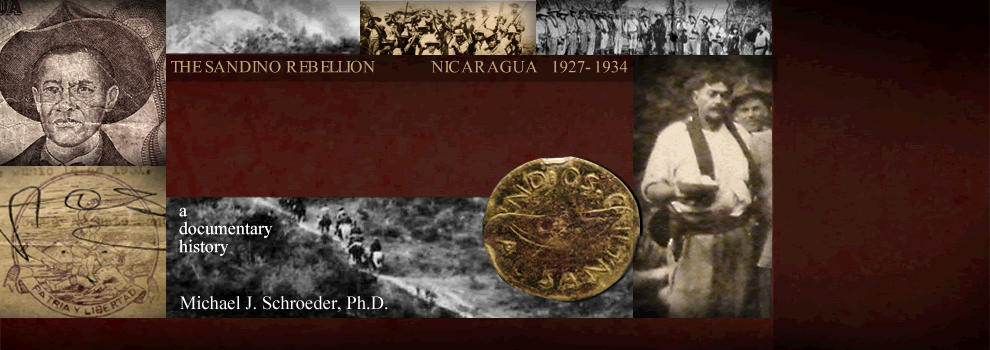|
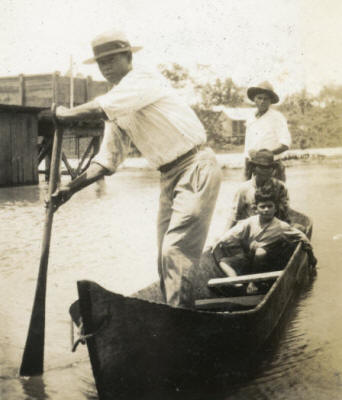 THIS IS THE fifth PAGE
of documents for the second HALF of 1928
on Nicaragua's Caribbean Coast
region, housing materials dated during the 36 days from October 19 to
November 23.
THIS IS THE fifth PAGE
of documents for the second HALF of 1928
on Nicaragua's Caribbean Coast
region, housing materials dated during the 36 days from October 19 to
November 23.
Dominated by the
missives of Captain Edson at Poteca,
the page shines a bright
light on the Marines' tactical &
strategic thinking about the war
against Sandino as expressed by one
of its most capable & effective
field officers. On a different
note, Moravian missionary Guido
Grossman's missive to Major Utley
(19 October) emphasizes the
Moravians' commitment to political
neutrality and the Indians' rights
of citizenship in the upcoming
elections. The following
letter from Pedro R. Reyes to Dr.
Hector Zambrana offers a different
take on Costeños' insistence on
their rights as citizens, in this
case free speech via handbills.
Major General Lejeune's letter to
Gen. Feland (31 October) on
the concerns of Mr. Amphlett of the
La Luz Mining Company that the
Marines will leave the mine
undefended reveals something of the
Marines' ongoing internal debates
about how many scarce resources to
devote to a zone of questionable
strategic value, and prefigures
their emergent strategy of
withdrawing troops and thus
compelling company towns to foot the
bill for Guardia protection (see
esp. 1931-32 in these pages).
Lt. W. C. Hall's intelligence report
of 9 November ("Confiscated pistols
of several Palestinians")
illustrates the Marines' ongoing
efforts to monopolize all
substantial means of organized
violence-making at the level of the
state (see Max Weber), while also
casting a rare light on one of the
region's small but important ethnic
minorities. Especially
noteworthy is the nearly complete
silence on the November 4 elections
that brought Gen. Moncada to the
presidency — a clear indication that
the elections went off without a
hitch across the Eastern Area, and
of Costeños' desire to exercise
their full rights as citizens.
By a huge
margin, Costeños ignore Sandino's appeal
to boycott the ballot box. A link to 12 State Dept photographs
of the elections in Bluefields &
Puerto Cabezas is included.
|
|
PERIOD MAPS
|
|
1894 mosquito
shore

27 MB,
library of congress
|
1920s
Standard Fruit

6.5 mb,
US National archives
|
1928 Rio wanks
Patrol

3 mb, us
national archives
|
1931 Moravian

2.4 mb,
coMENius press
|
|
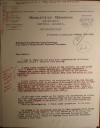
|
19 October
1928.
Letter from Guido Grossman, Puerto
Cabezas, to Major H. H. Utley, Puerto Cabezas,
p. 1.
"I beg to thank
you for your kind communication of
October 18th. 1928, which I received
this morning. ¶ I have taken carefully
notice of its contents and most gladly
will I assist to combat against all
improper propaganda - threats and other
means of intimidation used by the
various parties in order to keep the
Indians away from the polls on election
day. ¶ I have already instructed my
missionaries to urge the Indians to
fulfill their duties as citizens of
Nicaragua on the day of election, and
will, encouraged by your kind request,
write again to that effect and at the
same time that they shall keep watch on
those propagandists and report any
irregularity to me, and I will then
forward the complaints to your office. ¶
At the same time pardon me for taking
the opportunity to inform you that both
parties: the conservatives as well as
the liberals have brought charges to me,
against some of our missionaries not
being neutral. ¶ Upon my investigation I
found these accusations to be void. ¶ We
desire to be absolutely neutral in this
campaign, which stirs the people of this
coast to the very inmost, as it is
really the first time, with the aid of
your most esteemed Government, that
these people have a chance to express
their political sentiment through a free
vote."
|
|
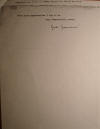
|
19 October
1928.
Letter from Guido Grossman, Puerto
Cabezas, to Major H. H. Utley, Puerto Cabezas,
p. 2.
"With much
appreciation I beg to be ¶ very
Respectfully yours, ¶ Guido Grossmann"
|
|
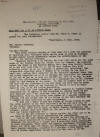
|
1.
19 October
1928.
GN-2 Note No. 1, re 4 Sept. letter from
Pedro R. Reyes, Bluefields, to Dr. Hector
Zambrana, Managua, Major V. Bleasdale,
Managua, p. 1.
"1. The following
letter from Mr. Pedro R. Reyes is quoted
for your information: ¶ “Bluefields, 4
Sept. 1928. ¶ “Dr. Hector Zambrena, ¶
“Managua, ¶ “My Dear Friend: ¶ “Not
until Tuesday evening of this week did I
have the pleasure of receiving your
radiogram which really came to give me
strength to hold myself always
unbendable before the arbitrariness of
the Chief of the Guardia Nacional. ¶
“Enclosed herewith I am sending the hand
bill which was the whole cause of the
trouble which Mr. Samuel Weil and
Company, who appeared before the Chief
of the Guardia saying that they were
nastily insulted in the said hand bill
and it was on this account that said
authority called on me and demanded by
presenting (producing) the responsible
signature which I denied to do stating
to him that I would only produce that
signature to the District Criminal Judge
when the latter compelled me to do so
through the respective law procedure or
for him to put me in jail and torture
me, that is to say, to make evident the
arbitrariness committed on a newspaper
man in his citizens right and the
freedom of the press. To this he replied
that if I did not show him the signature
it was all right but that then he would
place me at the order of the Director of
Police so that he would apply me Art. 18
of the Police Regulation. ¶ “At 3:00
P.M. last Monday I was again summoned by
Captain LePage Cronmiller Jr. to appear
at the Direccion de Policia where he had
just reported that I had violate Arts.
18 and 29 of the Police Regulations,
that is, my having been author of a
pasquin (insulting article) and not
having sent to the Office of the Jefe
Politico the 7 numbers of that hand-bill
as per requirement. ¶ “I told him I
would accept the charge of having failed
to send the seven numbers to the Jefe
Politico’s office but that Art. 29 of
the Police Regulations was not
applicable because it had been repealed
by the Press law of 1911, to which
Captain Cronmiller, the accuser, replied
that that Press Law was not a law of
Nicaragua and that the Police Regulation
was. ¶ “In the end the Director of
Police applied the Press Law to me and
fined me $4.00 and $1.00 commutation for
confinement. ¶ “And as the said
Cronmiller insisted in that the Director
of Police should sentence me as author
of pasquins, as that is what he
considers the hand-bill, I argued that a
hand-bill which circulates in broad
day-light, which shows the legally
registered printing shop title, and
which does not insult any determinate
person, cannot have been, legally
speaking, qualified as a pasquin; I also
argued that Art. 18 Police Regulations
cannot apply in this case as it was . .
. "
|
|
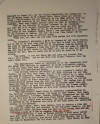
|
2.
19 October
1928.
GN-2 Note No. 1, re 4 Sept. letter from
Pedro R. Reyes, Bluefields, to Dr. Hector
Zambrana, Managua, Major V. Bleasdale,
Managua, p. 2.
“ . . . repealed
by Press Law, for the Police Regulation
was promulgated by the Executive Power
on 25 October 1880, while Press Law
besides being a Constitutive law and
ordering in its 45th Article that all
dispositions relating to the Press which
are opposed to it are repealed, went
into direct effect since the 22nd of
November 1911. ¶ “But as the Director of
Police listened to our arguments and
told the said Captain Cronmiller that he
could not find anything in the law to
judge us by, he was ordered to place us
at the order of the Criminal Judge,
where I was conducted as a prisoner by
the Director of Police, but said
official (the Judge) set me free
immediately after my arrival there. ¶
“Mind you, all this was not done with
smiles but with murderous looks. ¶ “In
Saturday’s editorial I give an account
of all these abuses. Let us see if at
last they send me up the bay at 4:00
A.M. which is the wish of Captain
Cronmiller who is displeased with e
because in the heat of the argument I
told him that if they had come to
enforce the law, they should abide by
the Press Law, but if they had come to
violate the law, then he could put me in
jail or shoot me as he wished. ¶ “Sum
total, so far the thing has not gone any
further than what I have stated. Let us
see what will happen Saturday when the
paper comes out. ¶ “The Departmental
Board of Elections is of the impression
that the señor Jefe Politico did and
this can well be repeated. From Rama
alone, I am advised by J. Anto. Salas
that Dr. D. Barreto has arrived to
compile a list of all foreign people or
people of other republics of Central
America, so ask for naturalization
papers from the Jefe Politico. The
custom here in these cases has been to
ask the Jefe Politico to receive proof
from the interested party and once this
proof is received the former submits it
to the respective Minister so that said
authority may issue the naturalization
papers. ¶ “The Departmental Board gives
an erroneous interpretation to the
Harrison Altamirano Treaty, for based in
said Treaty, they register Salvadoreans,
Italians, French, Germans, Caymaneros
and any son of God that says ha has
lived here since before 1894, people
who, besides, do not submit true
evidence, but only present two witnesses
to testify to it, witnesses who belong
of the same party are interested parties
in the matters. ¶ “Another thing, Rama,
Corn Island, Cabo de Gracias a Dios and
San Juan del Norte are not included in
the Mosquitia Reserve, ad the
Departmental Board includes them and
that is the reason they are introducing
a hell of a lot of niggers from all
sides. ¶ “Confidentially, I wish to
inform you that I have never before seen
this coast as at present. It is
discouraging negligence, no one wants to
do anything, you cannot count with
anybody, and it is not only in
Bluefields but all along the coast. Just
think, in Rama . . . “
|
|
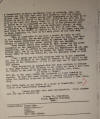
|
3.
19 October
1928.
GN-2 Note No. 1, re 4 Sept. letter from
Pedro R. Reyes,
Bluefields, to Dr. Hector
Zambrana, Managua, Major V. Bleasdale,
Managua, p. 3.
" . . . a
Conservative majority has always been in
evidence, today the Liberals are the
ones that have that majority; Why? why
because Segovia (see Note #1 below)
cannot make propaganda as he used to do
because he has to attend to his Fiscal
Agency or his wife who is sick or the
baby that cries; Genie has to be looking
for the heads of cattle he is to
slaughter of has to go to the plantation
that Guindos is the only one left, and
he multiplies himself to make an
imitation of a propaganda which is all
that is left now. The only thing to the
credit of Segovia is that as the money
runs low he keeps supplying it, that is
his only grain of san (his only
contribution). ¶ “Here in Bluefields it
has been a matter of state to fill in
the Directories, for no one wanted to
serve in them, does that did not not
excuse themselves are unable to perform
the duties, some because of inability
and others because they are impeded. ¶
“From Puerto Cabeza they inform me that
Afraro was not given possession of the
Camandancia until last Saturday, make
the negotiation, for if Alfraro is not
given the Comandancia we are completely
lost, for if we were to obtain 100 votes
before, in Puerto Cabeza today we will
not obtain 50, for the pression there is
very marked. ¶ “Over a month ago the
Jefe Politico told me he had submitted
the Plan de Arbitrios of the Junta de
Fomento of Corn Island to the Ministry
of the Government, if you do not mind
see if they expedite this matter. ¶
“Upon expression my appreciation for
your attitude in defense of this your
friend with relation to the abuses of
which I have the victim on the part of
the Jefe de la Guardia, etc, stec.,
[sic] ¶ /s/ Pedro R. Reyes.” ¶ NOTE NO.
1: The agent thinks the reference is
about trouble in Segovia. He says that
much troube in Segovia was expected to
alter the political situation in Rama
and Cabo Gracias a Dios Areas. GN-2. ¶
GN-2 NOTE: Reyes is the Editor of a
paper in Bluefields. Also assists with
Conservative Propaganda. ¶ 2. Please
consider this note confidential. Place
it under lock and key or destroy it."
|
|

|
24 October
1928.
Brigade Order No. 69,
Gen. Feland
to
command.
"1. The next two
weeks will witness the final test of
this Brigade. We are pledged to do our
utmost to prevent any physical
interference by any of the force of
disorder with the Nicaraguan Elections.
¶ 2. The situation demands of you much
patience and care in our notions in
order that peacably inclined citizens
may be protected and fear nothing. It
demands increasing vigilance to guard
against the few who may try to disturb
the peace and who may even attempt
directly to interfere at voting places.
¶ 3. I have confidence in your meeting
this test. If violence is attempted,
strike hard at those guilty, while doing
all in your power to protect and
reassure the innocent."
|
|
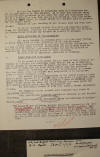
|
25 October
1928.
Native report to Capt.
M. A. Edson (bottom of
page), p. 1.
[Excerpt from a serial intelligence
report:] "A native report to
Capt. Edson gives to following as
Sandino’s future plans: ¶ ‘On 10-25-28
the following Sandino sub-Jefe appeared
in the area: Felipe Briseno, Juez of
YACALWAS – Captain Emillo Aguilar, Juez
of MUSTAWAS – and Laislado Mora,
resident of LA CEIBA, halfway between
BAKA and YACALWAS. They have a few men
with them possibly about ten (10). They
came here from the vicinity of MURRA,
following the patrol which just returned
from that area by about three days . . .
"
|
|
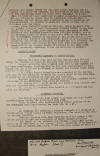
|
25 October
1928.
Native report to Capt.
M. A. Edson (top of
page), p. 2.
" . . . Briseno
has issued orders for all able bodied
fighting men to appear at a place now
unknown, but believed to be near the
home of Juan Masonereso, about two miles
above YACALWAS, on 4 Nov., 1928, to
register their names and to swear
allegiance to Sandino. All men failing
to appear will be considered
anti-Sandino or Yankistas, and are
warned that retaliation may be expected.
All non-combatants are ordered to leave
the valley at once and to withdraw into
the brush. ¶ Briseno gives Sandino’s
plans as follows: Troop movement from
his present location (near headquarters
GUIGUILI RIVER) to the COCO VALLEY via a
new trail just completed which debouches
on COCO somewhere near YACALWAS
(probably down RIO POLO PRIETO), and by
the GUIGUILI TRAIL. He plans to clear
the COCO of the Machos as far as
MUSTAWAS. Sandino is boasting of new
allies who will furnish many men,
supplies and aeroplanes. There is no
information concerning activities in
relation to elections on 4 November, but
Briseno promises that within fifteen
(15) days from 10-25-28 there will be
the biggest battle yet fought in the
COCO RIVER VALLEY, evidently referring
to the obliteration of POTECA’."
|
|
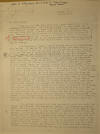
|
1.
25 October
1928.
Letter from Capt. M. A. Edson, Poteca,
to " My dear Major" H. H. Utley, Puerto
Cabezas, p. 1.
"My dear Major:-
¶ Back to the fold once more and I
must admit that it is a damned fine
feeling. We finally managed to come
under the 11th Regiment regime for some
three weeks - for orders, rations and
supplies, which, I think, will qualify
this outfit as the most cosmopolitan
organization in Nicaragua, being
subjects of Eastern Area, Comsperon,
Brigade and Northern Area, - located in
No-Man’s Land (there is no geographical
code number for POTECA in any code I
know of) - and when at home, Lords and
masters of all we survey. ¶ The Congojas
- Tamis - Murra patrol was a big
disappointment to me. It was by far the
hardest patrol yet made by me - and that
means it was not so easy as it might
have been. We left here an hour and a
half before daybreak on the 4th, hoping
thus to fool some of our observant
neighbors, who see all without being
seen. On the morning of the 6th we
passed the mouth of the Congojas river.
Here I located an old foot trail leading
southwest, and another used by animals a
couple of hundred yards away from the
Congojas river, and parallel to it.
Opposite the mouth of the Arenal Creek,
we flushed an outpost of four bandits,
who left hurriedly, leaving clothing,
food, etc., behind them. However, they
left without personal injury - which was
not as it should have been for I would
have liked to have stopped all four.
Still having the idea that a trail led
west from Gulkes - although the idea was
considerably shaken by discovering the
new mule trail mentioned above, - I send
a reconnaissance, or rather led one, to
that place and found only local trails
around the potrero. While eating chow
preparatory to starting our patrol
towards Murra, west coast planes made
contact and dropped the letter of
instructions sent you. As a result, I
bivouacked at the mouth of Congojas
river until the morning of the 12th,
continuing active patrolling each day.
This delay effected both the health and
the morale of the men, for it
necessitated living in leaf shacks and
caused some talk among the weaker minded
men which would otherwise have been
avoided. Because of the outpost found in
that vicinity, I did not consider it
wise to withdraw to Poteca and make a
fresh start from there on the 11th. ¶
The patrol consisted of four squads of
seven men each, two cooks, two runners,
two sergeants, Maddux, and Stephenson
and myself. We had a guide who was not
so good, and I think some of the men had
a great desire to bump him off -
concurred in at times by myself. The
trail followed the first day was one out
by Jiron and showed evident signs of
considerable animal travel, estimated
60-75, and great haste. Several saddles,
mule skeletons, etc., were scattered
along the way. The next day we followed
the bed of the river except for about 5
miles when we skirted the edge of a deep
canyon. After leaving the Congojas, the
trail was much better, showed signs of
more traffic, and was not particularly
difficult, . . . "
|
|
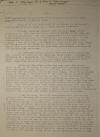
|
2.
25 October
1928.
Letter from Capt. M. A. Edson, Poteca,
to " My dear Major" H. H. Utley, Puerto
Cabezas, p. 2.
". . . although
we crossed one mountain which required
over three hours down hill travel on the
way back. ¶ Most or all of this stuff is
contained in the report sent in my mail
last night so I shall skip it in detail.
¶ I fully expected contact with the main
bandit force and the fact that we had no
contact worthy of the name was a big
disappointment. The main group seems to
be south of the Tamis valley so my route
of advance did not touch them. It was
interesting to learn that we got 25
bandits at Ililihuas (see report) - and
that they - the bandits - knew that “the
same troops who drove us out of Poteca
are coming up the Congojas” - with the
result that they abandoned two perfectly
good ambush positions on our approach
and scattered. ¶ By combining bandit
reports with our known casualties, this
patrol can count up the following bandit
dead - Morabila 4 - Ililihuas 25 -
Espanolita - 5 - Murra 1 - a total of
thirty five, which I do not think is so
bad. One might add Aguerro to that list
- dead from exposure and fright after
Morabila. ¶ After getting three mules
and pack gear from Lieut. Hall, it was
my intention to back trail until we
crossed several well used bandit trails
found on the 17th, and then follow them
with the hope of running into their main
camps. From the positions found at
Poteca, I believe that is the only way
to actually find and drive them out.
Between you and me - it is surprising
that the 11th regiment has as many minor
contacts as they do, for they travel
only over the paso real’s - fine hard,
wide trails thru open pine ridge country
when a contact with bandits is 99 1/2%
improbable. They will never hit them
unless they get off into the small, bush
trails, suitable for bandit tactics, and
the routes used by the outlaws. I would
have liked a week’s try at my theory
(expressed above) - but instead came
orders sending us back to Poteca. ¶ I
may be wrong, but both Stephenson and I
got the impression that we were not
particularly desired over there in the
NA [Northern Area] play-ground. In the
first place - no one from the Colonel on
down ever expected us to get thru.
Holmes was quite surprised to meet use
on the 15th. Bets were current around
the area that here was one thing we
could not do - and that we would never
arrive in the Murra area. Holmes said he
did not expect to meet us before the
18th of the month at the earliest, if
the. As a result, their plans were laid
counting us out - so when we arrived
they did not know what to do with us.
Everyone tried to send us into San
Albino immediately - not realizing that
after once making at rip like that we
might like to get some of the results of
whatever contacts were in sight. We were
ordered into back areas after I declined
the San Albino offer until the work was
done, where contact with only small
scattering groups was possible if any -
so on the 17th I decided to take
advantage of the lack of definite orders
later than that date to try my own
tactics - only to be ordered back from
where we came. . . . "
|
|
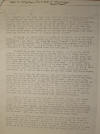
|
3.
25 October
1928.
Letter from Capt. M. A. Edson, Poteca,
to " My dear Major" H. H. Utley, Puerto
Cabezas, p. 3.
". . . Don’t get
the idea that they were not glad enough,
personally, to see us and we were
treated right royally and, I believe,
the entire area were anxious to have us
pay them a visit. This bearded, ragged,
hard faced and trail toughened outfit is
well advertised thru our contact with
Ridderhof and Santa Cruz, and they all
seem glad to extend us a fine welcome at
home - but not to run around in their
back yard, stirring up or digging out
something they have thus far failed to
find. Do I make myself clear? ¶
Aviation, as usual gave us excellent
service. My panel detail pulled a boner
at the Congojas mouth which I have not
yet reported to Secbrig, but will. The
code UL means “boats” - LU - “situation
serious”. I displayed “UL - going 3
miles down stream” - they read “LU -
situation serious - going three miles”.
At no time was the situation serious
from our standpoint. ¶ Because we packed
our rations in rolls, the food was quite
scarce. You might inform Capt. Shearer
that if he bills me for rations from the
12th to 22nd of Oct. inclusive, I shall
most certainly refuse to pay him. My
ration for the 12-13-14-15 consisted of
4 cans sardines, one pound of corn beef
- one can of beans - one third can of
salmon and a little hard tack. I
consider that to live four days on that
- pack it on ones back - is enough
without paying 54 cents per day for the
privilege. From the 16-22 incl, our
rations were furnished by the N.A.
[Northern Area] - Stephenson has the
same sentiment, so he may as well cross
us off the books for those dates. ¶ The
trip over was so hard on the men that I
requested permission to take them back
thru San Albino - Quilali and Santa
Cruz. This would also allow us to patrol
the Poteca - Santa Cruz area. This was
granted by Col. Dunlap but later revoked
by the addenda to FO 8, dated 10-17-28.
All of the officers and men we met
treated us fine and gave us a royal
welcome - and I know we would have had a
good trip back thru Albino. The men were
somewhat disappointed at first - but
when they realized they were back in
Poteca three or four days earlier - they
cheered up considerably and I believe
are glad now that we were ordered back
thru the Congojas. ¶ Altho we had no
contact except the small affair near
Murra resulting in killing one (1)
bandit - we reconnoitered the Congojas
valley, chased out such outposts as they
had there - ran Quintero and Col.
Montoya out of their camps - destroyed
Colindres place in the upper Tamis,
captured considerable correspondence and
a few supplies, gained additional
information on trails and routes between
here and Murra - and once more proved
that the impossible can be done - ie -
go from Poteca to Murra or vice versa. ¶
I do not think the bandits have any idea
of using the Congojas route again if it
can be helped, altho I shall continue to
make irregular and frequent patrols to
that area. They have much easier trails
to Paredes and east of Jalapa which are
open to them. Any active patrolling from
Jalapa to east of Paredes in the
province of NA - and would be extremely
difficult from this end."
|
|
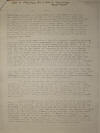
|
4.
25 October
1928.
Letter from Capt. M. A. Edson, Poteca,
to " My dear Major" H. H. Utley, Puerto
Cabezas, p. 4.
" . . . That area
is harder to reach from here than Murra
- and as I said above, this last patrol
is the hardest I have made yet. As a
result - unless the outlaws decide to
retreat thru Guiguili and Cua, it looks
to me as tho the period of active and
long patrols for this organization is
about over. That does not mean we will
not continue putting feelers out in all
directions, for patrols will continue to
go south, east and west, - but I doubt
if anything will be encountered. If the
bandits retreat south east to the upper
COCO - CUA area, we are ready to push
out in that direction. I am already
contemplating a patrol to Guiguili next
week. ¶ Along this same line - the dry
season is rapidly approaching which will
facilitate movements by trail and pack
animals. My rolling stock now consists
of one horse and four mules. I am
reaching out to concentrate all
available animals and hope in the next
ten days or two weeks to increase it to
15 or 20 animals. That will mean pack
equipment. The 11th Rgt. has an
excellent saddle arrangement which I
would like. We have 3 complete sets here
now. If you could have 12 additional
aparejo, complete, transported via plane
to Cabezas - thence to Bocay by plane
and here by boat - or possibly dropped
complete by Fokker drop, I would like
it. I have no idea what the plans are
after 4 November, whether they
contemplate withdrawal or continued
activities, so I am basing my plans here
on continued and indefinite campaigning.
¶ Along this same line, I do not believe
the 11th Rgt will take over Poteca. I
think that was dependent upon their
river patrol. That project has been
abandoned - all the NAVY burned and
scrapped - so I think you may put a
permanent circle around Poteca and
definitely call it in your area of
operations. ¶ The Tulsa detachment was
ordered here to garrison an outpost at
BANA during my Murra patrol. It is still
here - all troops now being actually in
Poteca, as the BANA post was secured on
the 21st. It is my intention to hold
them here for the next ten days - until
the next bandit move is disclosed. If
Sandino moves into the upper river
valley, I will then have my force
concentrated for a quick drive in that
direction. Is this a good plan or not? ¶
If the bandits show no signs of moving
south east towards Cua, I shall send the
Tulsa either to Bana or back to
ILILIHUAS - probably the latter. It is
thot that they might be available for
MASTAWAS - thus releasing that part of
the 59th for Walker or Bocay if you so
desire. The need for Ililihuas was
dependent largely upon a bandit move
thru Gulkes towards Garrobo - and I have
about concluded they will not try that.
I think the Guiguili - Cua move more
probable - and a Honduras to Western
Segovia move most probable. I may be all
wrong. In any case I think, depending on
the results of my Guiguili patrol, I
shall extend my outpost force south
rather than north east. Comment
requested on this. . . . "
|
|

|
5.
25 October
1928.
Letter from Capt. M. A. Edson,
Poteca,
to " My dear Major" H. H. Utley, Puerto
Cabezas, p. 5.
". . . We are now
in process of transition from field to
garrison duty with patrols of one - two
- four days duration, in line with the
opinions expressed above. ¶ Planes beat
me to the rest of this - can you send
them for additional pick-up between now
and Sunday? ¶ Edson"
|
|
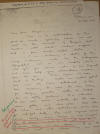
|
1.
26 October
1928.
Letter from Capt. M. A. Edson, Poteca,
to " My dear Major" H. H. Utley, Puerto
Cabezas, p. 1.
"My dear Major:-
¶ This is a continuation of the pick up
made yesterday which was cut short by
the arrival of Guyman and Scribner with
mail, canteen supplies and a few much
needed clothes. ¶ I am enclosing a
sketch of this camp enclosure made by
the distinguished topographist now in
our midst, which will give you some idea
of our layout and may help your
observations made from the air. Once
again we are short of tentage. With our
entire patrol here and the Tulsa
detachment, it has been necessary to use
the one house for sleeping quarters
although as Pollock has so aptly
pictured, it is intended to use said
house entirely for the men room - galley
and store room. Also when the Tulsa and
other detachments leave here for outpost
duty, they will require canvas since
nearly every house is now occupied by
the owners – and I do not care to
dispossess them in our favor. If you or
the West Coast will please drop us
twelve . . . "
|
|
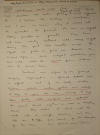
|
2.
26 October
1928.
Letter from Capt. M. A. Edson, Poteca,
to " My dear Major" H. H. Utley, Puerto
Cabezas, p. 2.
" . . . (12)
additional tents with flies and repeat
and sixteen (16) extra flies (tent – not
horse). I would appreciate it. I believe
the tentage is available and I see no
reason why it should not be provided to
furnish the men as comfortable living
quarters as possible. They have not been
overly bothered with many comforts
during the past six months or so. No
repeat no poles or pins are desired. As
I said before each outpost established
from here will take its canvas from
Poteca when it leaves here. ¶ Enclosed
are copies of our present company
organization – special details now in
effect – and of our daily routine.
Between patrols, routine police and
schools I hope to give the men enough to
keep them fairly well occupied and
contented. The present trench system is
now a kneeling trench. One section at
least will be made into a simple
standing and then into an A type fire
trench for the education of the men. We
found some loose . . . "
|
|

|
3.
26 October
1928.
Letter from Capt. M. A. Edson,
Poteca,
to " My dear Major" H. H. Utley, Puerto
Cabezas, p. 3.
" . . . wire on a
recent patrol so a short section of the
present single apron fence will be made
into a double apron - and short
stretches of other obstacles constructed
for education also. ¶ The men are fairly
well clothed now, although I would like
our requisitions filled as completely
and as rapidly as possible under
existing transportation facilities. The
Marine patrol was very hard on clothing
and shoes so those men are sadly in need
of additional clothing. My last order
included leggins so that every man would
have leggins for patrols and for
inspection here. Beards are no more
common - the House of David having been
converted and clean shaven the order of
the day. ¶ Recreation facilities are
improving. We have a volleyball court,
with a net made from surveyed mosquito
net in place of the regulation net lost
in the drop. The cards furnished by the
Eastern Area Exchange were received and
are much in use. Horse shoe pitching is
most popular with a tournament now being
played off and finals tomorrow. A tug of
war between teams from each outfit is
scheduled shortly. Competition for first
place in chow line, cigarettes . . . "
|
|
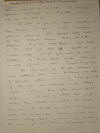
|
4.
26 October
1928.
Letter from Capt. M. A. Edson, Poteca,
to " My dear Major" H. H. Utley, Puerto
Cabezas, p. 4.
" . . . etc. is
extended to best rifles – best personal
appearance, best tents and any other
“bests” that can be thought of. ¶ In
order to give the officers something to
keep themselves occupied, I have
assigned jobs as shown on the special
duty order. In this Pollock becomes P-X,
and P-3; Stephenson P-2 and mess
officer, and Cook is P-1, P-4 and Com.
off. Quite a capable staff, but it gives
each of them something to think about
besides ‘When do we eat – if ever’ and
‘I want to go home.’ ¶ The only reason
for the four horsemen of mine galloping
down river to Bocay was lack of adequate
rations – as near as I can find out. If
they had not overturned in the Collagis
rapids, I believe their plan was to go
to Waspuc. A list of articles lost and
for which they should be checked has
already been sent to DeWitt by mail. A
summary court was recommended because I
could only award 5 days B&W as CO – and
considering the reason for the AWOL, I
consider that . . . "
|
|
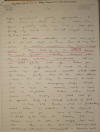
|
5.
26 October
1928.
Letter from Capt. M. A. Edson, Poteca,
to " My dear Major" H. H. Utley, Puerto
Cabezas, p. 5.
" . . . type
punishment fairly appropriate. I also
have a DCM pending – although the
offense probably rates an SCM. After
this flurry of courts, I do not expect
many - if any - more. ¶ Our ration
situation is now very good. It is the
best that we have had at any time since
I started exploring the Coco, or Wanks
river. My hold up of the Indians during
the recent operation evidently
interfered with the supply situation
considerably - but we are still fairly
well off. Unless you advise us
differently, I shall try to make up for
several months short rations by living
fairly close to the ration allowance
though it may be necessary to call for
one or two emergency drops. Right now we
have no canned meats or ham and no
vegetables. Unless ration boats arrive
by Sunday, I shall call for a special
drop of several articles of food. ¶ I
have told Burk what we particularly
would like in addition to the shipments
received so far. Some of these items I
doubt if he has at Bocay, but Shearer
may be able to supply him and us. Here
is the list:- asparagus (#2½),
blueberries (#2 cans) – mincemeat –
hominy grits . . . "
|
|
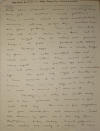
|
6.
26 October
1928.
Letter from Capt. M. A. Edson, Poteca,
to " My dear Major" H. H. Utley, Puerto
Cabezas, p. 6.
" . . . olives
(green preferred) – raisins – cranberry
sauce - tuna fish – mustard – sweet
potatoes – lemon and vanilla extracts –
spices assorted (including cinnamon, nut
meg, all spice, etc.) – smoked hams and
plum puddings. These next two articles I
do not think Shearer has on hand, but I
would suggest they be ordered and
furnished troops in the field – powdered
milk (KLIM) and powdered eggs. Klim is
easily dropped by plane – it makes
excellent coffee and cocoa and is better
than canned milk in many respects. The
powdered eggs find use in hot cakes,
doughnuts, and even as scrambled eggs.
Our fresh beef supply is limited and I
have conserved it to considerable extent
because there was no dope as to how long
we would be around to draw on it. ¶
Thanksgiving is only one month away and
I have promised the command a good meal
that day. Here are a few suggestions for
your consideration and comment:- I would
like delivered by plane one or two days
before Thanksgiving twelve turkeys –
Vermont preferred - duly roasted and
ready for eating. It seems . . . "
|
|
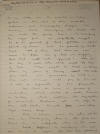
|
7.
26 October
1928.
Letter from Capt. M. A. Edson, Poteca,
to " My dear Major" H. H. Utley, Puerto
Cabezas, p. 7.
" . . . to me
they can be roasted in Cabezas, packed
in tin cans or other suitable containers
and successfully dropped. The dressing
should accompany the birds. We can make
the gravy here. To accompany the royal
fowls, we respectfully suggest 50 to 75
pounds of Irish potatoes – 20 to 30
pounds of onions and 40 pounds of white
bread. All of these last items are over
issues to take care of lose in dropping.
Does that meet with approval? Also for
the day I would like about eight (8)
kegs of beer. These might be boxed in
Cabezas, taken by plane to Bocay, about
two weeks from now, and forwarded by
boat. The men concerned will pay for
this and I will be responsible for due
payment. ¶ We have an oven in process of
construction, which should be ready
tomorrow or Sunday, which explains the
requisition for mincemeat, blueberries,
etc. We hope to have hot bread,
biscuits, and cakes before many days. ¶
That I believe covers the ration
situation and our Thanksgiving chow. All
plans are based on an indefinite stay in
the area. ¶ Lieut. Stephenson is
wondering when and how he is to rejoin
the New York detachment . . . "
|
|
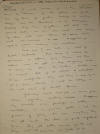
|
8.
26 October
1928.
Letter from Capt. M. A. Edson,
Poteca,
to " My dear Major" H. H. Utley, Puerto
Cabezas, p. 8.
" . . . It will
be much easier for us here to send him
to Bocay if the planes can pick him up
there for further transfer to either
Cabezas and the Cleveland - or to
Managua. Probably they have forgotten
all about his present duty on the other
coast and hurry up orders will come
through at some time most inconvenient
to us. Suggestions for report of fitness
markings are enclosed. ¶ Cook and I are
both in need of dental treatment. The
reason I asked for permission to return
from Murra via San Albino was to get a
days temporary work to carry me through
the winter. Neither case is urgent, but
if we should be scheduled for an
indefinite stay out here – one of us at
a time should be sent to Cabeza sor the
west coast for dental repairs. ¶
Yesterday’s mail brought a memo from
Shearer regarding clothing issues. It
appears my remarks were perhaps a little
irritating in a previous letter – but
the question of giving the men
everything they can get under the law is
quite important to me. They get little
enough for the work they put out any way
one looks at it . . . "
|
|
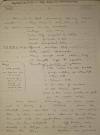
|
9.
26 October
1928.
Letter from Capt. M. A. Edson,
Poteca,
to " My dear Major" H. H. Utley, Puerto
Cabezas, p. 9.
" . . . Here is a
list summing up my various wants. They
may be sent when, if and by such means
as are available. ¶ Tentage (see above)
¶ Lester bag (requested by radio) ¶
Creolin for mules (do) ¶ Creosol
disinfectant (do) ¶ Official envelopes
(do) ¶ Daily ration statements. ¶ Memo
receipt book (NMC-734) ¶ 50 Targets Type
‘L’ (pistol) ¶ Recreational facilities
as follows:- ¶ Reading material ¶ 2
balls, indoor baseball, and 2 bats ¶ 1
pump, inflating for volleyball ¶ 1
volley ball ¶ 1 Medium ball ¶ 3 pr. dice
for ace-deuce ¶ 3 sets boxing gloves ¶
(Most of this could probably be gotten
from the station ship.) ¶ Also: 1 Meat
grinder ¶ 100 prop shear pins for
outboard ¶ As much gas and oil as can be
sent up and one additional outboard
motor ¶ When Mosier and Schoenberger and
Paine were sent to Bocay from Gilikwas –
eleven (11) blankets were donated by one
of the men of this command. None of
these were ever returned. Can not these
be sent out on gratuitous issue and
taken care of by certificate? Cpl.
[Munro], now enroute to Cabezas for
discharge has two of them due him.
Maddux also furnished . . . "
|
|
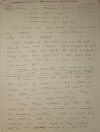
|
10.
26 October
1928.
Letter from Capt. M. A. Edson, Poteca,
to " My dear Major" H. H. Utley, Puerto
Cabezas, p. 10.
" . . . the
clothing for Stengel, consisting of ¶ 1
shirt, cotton, size 1 ¶ 1 trousers, SS,
size 2M ¶ 1 socks, woolen, pr., size 10½
¶ Five ponchos were also donated
and have never been replaced. I will
write Shearer a note on this subject.¶
The health of the command is the best
that it has been since last May or in
fact since we left the port the first of
April. Today’s list shows four men, all
light cases, and we have been down to
two men on the sick present list. ¶
Morale has never been low – but it is at
a high point now and improving daily. ¶
I believe that this more or less covers
all points of interest or which should
be brought to your attention. At least
these two letters combined have been
long enough to cover most anything. ¶
The three canteens of sperm oil, castor
oil and clean varnish were received in
excellent condition. Not a single drop
was lost – but for some reason the
containers are now more or less empty.
Cook says ‘Not a last drop and good to
the last drop!’ . . . "
|
|
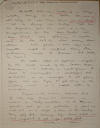
|
11.
26 October
1928.
Letter from Capt. M. A. Edson, Poteca,
to " My dear Major" H. H. Utley, Puerto
Cabezas, p. 11.
" . . . DeWitt
tells me Walker is in Cabezas awaiting
transfer to the States. We were all
sorry to see him leave on a ‘medical’ –
but he always was lucky. Tell him his
departure from the river is a big
disappointment, for the ‘River Pirates”
and “House Thieves” were planning a
regular raid on the 59th Co when moving
down stream – food, panels – even eggs
and cigarettes might be misplaced during
their forthcoming cruise to Gracias. Ask
Walker - he knows! ¶ The letter dated 19
September, compiled by the masterminds
of the Eastern Area, Nicaragua, is
certainly a masterpiece. It should be
mimeographed or eletrotyped and
distributed as an example to all young
officers who are trying to get along in
the military world as a model letter of
instructions. ¶ Regards to the Wilsons,
Robinsons, et al. If city life becomes
too strenuous, we extend a hearty
invitation to the Mess in general and
you in particular to spend a weekend or
a couple of them in the country. Bring
golf clubs – swimming tops, tennis
rackets, and most important of all –
your pocket flask. ¶ Sincerely, Edson"
|
|
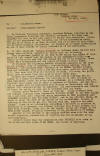
|
1.
27 October
1928.
Intelligence Report,
Capt. M. A. Edson,
Poteca, to Major H. H. Utley, Puerto
Cabezas, p. 1.
"1. On 10-25-28
Francisco Guatemala, resident Poteca,
reported he was under impression
Hernandez had recently returned to his
home near YACALWAS but that he had been
unable to verify this suspicion.
Guatemala is not considered very
reliable, all of his information being
old and of no value to us when received,
and it is thot he with-holds and
distorts valuable information. At
present he is under surveillance as one
of main sources of bandit information of
our activities. ¶ 2. At 1200, 10-27-28,
Braulio Morales, an informer whose
reports have always been reliable,
appeared at Poteca with the following: ¶
When Altamirano passed up the COCO RIVER
valley the middle of September he left
orders that the people in the
YACALWAS-GUIGUILI area remain in the
hills and that the valley was not to be
occupied. These orders were disregarded
and the people returned to their homes.
¶ On 10-25-28 the following Sandino
sub-jefes appeared in the area: Felipe
Briseno, Juez of YACALWAS,- Captain
Emilio Aguilar, Juez of MASTAWAS,- and
Laislado Mora, resident of LA CEIBA,
halfway between BANA and YACALWAS. They
have a few men with them, possible about
ten (10). They came here from the
vicinity of MURRA, following the patrol
which just returned from that area by
about three days. ¶ Briseno has issued
orders for all able bodied fighting men
to appear at a place now unknown, but
believed to be near the home of Juan
Masoneres, about two miles above
YACALWAS, on 4 November, 1928, to
register their names and to swear
allegiance to Sandino. All men failing
to appear will be considered
anti-Sandino or Yankisters, and are
warned that retaliation may be expected.
All non-combatants are ordered to leave
the valley at once and to withdraw into
the brush. ¶ Briseno gives Sandino’s
plans as follows: Troop movement from
his present location (near headwaters
GUIGUILI RIVER) to the COCO VALLEY via a
new trail just completed which debouches
on COCO somewhere near YACALWAS
(probably down RIO POLO PRIETO), and by
the GUIGUILI TRAIL. He plans to clear
the COCO of the Machos as far as
MASTAWAS. Sandino is boasting of new
allies who will furnish many men,
supplies, and aeroplanes. There is no
information concerning activities in
relation to elections on 4 November, but
Briseno promises that within fifteen
(15) days from 10-25-28, there will be
the biggest battle yet fought in the
COCO RIVER VALLEY, evidently referring
to the obliteration of POTECA. ¶ Aguilar
is now enroute to the WAMBLAN-MASTAWAS
area with the same orders regarding
presentation of fighting men and
withdrawal of all non-combatants. ¶
Morales states that the inhabitants near
GUIGUILI have taken to the hills and
that south of LA CEIBA the valley is
deserted. . . ."
|
|
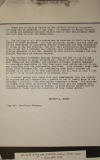
|
2.
27 October
1928.
Intelligence Report,
Capt. M. A. Edson,
Poteca, to Major H. H. Utley, Puerto
Cabezas, p. 2.
" . . . There are
no bandits forces in the GUIGUILI
district at present but they may be
expected at any time. No increase in
bandit strength is known and informer
believes Sandino has no more and
probably fewer men than when he left the
GULKE area. ¶ 3. The calling of all able
bodied men to register is tho’t to be an
effort to draft recruits. The talk of
allies, planes, and the clearing of the
COCO RIVER is considered without
formulation and only propaganda to bring
in the men desired. The fact that
presentation and registration is set for
4 November may indicate that Sandino is
holding a private election of his own,
whereby he will proclaim himself the
duly elected President of Eastern
Segovia. ¶ 4. The movement southeast
through GUIGUILI and CUA to the CUA and
PANTASMA valleys is quite probably as a
result of our recent patrols near MURRA
and ALS FLORES. Any movement northeast
towards MASTAWAS is considered
improbable at this time since such
action can not in any way interfere with
the approaching elections. Such movement
might take place after November 4th, but
considering past bandit actions and
tactics it is tho’t to be very
improbable, and all talk of such a move
s tho’t to be in the nature of
propaganda only. ¶ 5. A combat patrol
will leave this post immediately upon
the receipt of rations and will operate
for a period of ten to twenty days in
the YACALWAS - GUIGUILI - CUA area
unless otherwise ordered. The garrison
at POTECA will cover by patrols the BANA
trail and the TABLAZO trail and the
immediate vicinity of POTECA. A
distribution report will be submitted by
radio upon the departure of this combat
patrol."
|
|

|
3.
27 October
1928.
Intelligence Report, Map accompanying
original report, Capt. M. A. Edson,
Poteca, to Major H. H. Utley, Puerto
Cabezas, p. 3.
Map: "Overlay ¶
Quilali Sn Cruz Patnia ¶ & Vicinity ¶
1st Lt Zea & 2nd Lt Brown"
|
|

|
27 October
1928 (1700).
Radiogram from Capt. A. DeCarre,
Bocay,
to Major H. H. Utley, Puerto Cabezas.
"8627 NATIVE
REPORTS SANDINO AND PEDRO ALTAMIRANO
WITH FORTY MEN AT PITITA STOP PITITA
MIDWAYS BETWEEN CUA AND SANTA CRUZ STOP
BANDITS MOUNTED STOP INFORMATION
VOLUNTARY STOP PATROL TO INVESTIGATE
TOMORROW 1700"
|
|

|
27 October
1928 (1832).
Radiogram from Capt.
M. A. Edson, Poteca, to
Major H. H. Utley, Puerto Cabezas.
|
|

|
28 October
1928 (0924).
Radiogram from Capt.
M. A. Edson, Poteca, to
Major H. H. Utley, Puerto Cabezas.
|
|

|
1.
28 October
1928 (1830).
Radiogram from Capt.
M. A. Edson, Poteca, to
Major H. H. Utley, Puerto Cabezas, p. 1.
|
|

|
2.
28 October
1928 (1830).
Radiogram from Capt.
M. A. Edson, Poteca, to
Major H. H. Utley, Puerto Cabezas, p. 2.
|
|

|
3.
28 October
1928 (1830).
Radiogram from Capt.
M. A. Edson, Poteca, to
Major H. H. Utley, Puerto Cabezas, p. 3.
|
|

|
4.
28 October
1928 (1830).
Radiogram from Capt.
M. A. Edson, Poteca, to
Major H. H. Utley, Puerto Cabezas, p. 4.
|
|

|
5.
28 October
1928 (1830).
Radiogram from Capt.
M. A. Edson, Poteca, to
Major H. H. Utley, Puerto Cabezas, p. 5.
|
|

|
6.
28 October
1928 (1830).
Radiogram from Capt.
M. A. Edson, Poteca, to
Major H. H. Utley, Puerto Cabezas, p. 6.
|
|

|
7.
28 October
1928 (1830).
Radiogram from Capt.
M. A. Edson,Poteca, to
Major Utley, Puerto Cabezas, p. 7.
|
|
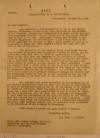
|
31 October
1928.
Letter from Major Gen. J. A. Lejeune,
Washington D.C., to Gen. L. Feland,
Managua.
"My dear General:
¶ Mr. Amphlett, a representative of the
La Luz Mining Company, Nicaragua, called
on me this afternoon at the request for
Mr. Fletcher, concerning a communication
which he had received from Lieutenant
Whaling, who is in command of the Marine
Detachment on duty at La Luz. Lieutenant
Whaling had written to Mr. Fletcher
suggesting the advisability of
permitting some of his former employees
of the mine to pan a small amount of
gold so as to provide a means for their
support during the time that the mine is
not in operation. ¶ The officials of the
Company fully appreciate the humane
reasons which actuated Lieutenant
Whaling in making the request, but the
fact that any trespass on the property
by inhabitants of the country would
cause the people living in the vicinity
to feel that they had the same rights
and privileges, and might result in
further serious injury to their
property. I told Mr. Amphlett that I
would write to you in regard to this
matter, and I would suggest that you
communicate the views of the Company to
Lieutenant Whaling for his guidance. Mr.
Amphlett spoke in the highest terms of
Lieutenant Whaling’s energy and ability
and was especially desirous that he be
not censured in any way for his
suggestion, as he knew that he was
actuated by the best of motives. ¶ Mr.
Amphlett was quite disturbed by the
possibility of the Marines withdrawing
from the mine and leaving it
unprotected. We have no information here
as yet as to the policy to be adopted in
regard to Nicaragua after the
inauguration of the new President, but I
feel sure that precipitate action will
not be taken, but that opportunity will
be given the Government of Nicaragua to
take over the protection of the mines by
means of the Guardia when the Marines
are relived from duty in that vicinity.
I hope that very soon after the
elections in this country and Nicaragua
are over, some definite policy will be
announced with reference to the
retention of the Marines in Nicaragua. ¶
With kindest regards and good wishes, I
remain, ¶ Sincerely yours, ¶ /s/ JOHN A.
LEJUENE"
|
|

|
2 November
1928 (1700).
Radiogram from Capt. C. F. B. Price,
Garrobo, to Major H. H. Utley, Puerto Cabezas.
|
|

|
2 November
1928 (2200).
Radiogram from Major
H. H. Utley, Puerto
Cabezas, to Gen. Feland, Managua; copies
to COs Poteca & Garrobo.
|
|
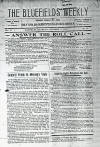
|
3 November
1928.
"General Frank R. McCoy's Visit,"
The Bluefields Weekly.
"On Saturday last
word was received by Major Sage, head of
the National Guard, that General McCoy
would pay a visit to Bluefields on
Monday following. The Major passed the
word to the Jefe Politico and friends,
so that very shortly after it was known
all over town that the President of the
National Board of Elections would be in
Bluefields on Monday, at about 11
o’clock, in the forenoon. ¶ The first
idea that began to form in the minds of
many was what sort of a reception should
be given the General; but after some
investigation into how long he would
remain and as to whether he would allow
himself to be feted, it was learned that
the General would only remain over
night, besides, it appeared he was not
out seeking fiestas. ¶ At eleven o’clock
on Monday morning the planes bringing
the General and his Chief of Staff,
Colonel Gordon Johnson, were heard in
the distance and, of course, in a few
seconds they were circling for a
landing. ¶ General McCoy was met at the
wharf by Major Price of the Electoral
Board, Major Sage, head of the National
Guard, and Captain Rose and Matteson and
other American officers stationed here.
¶ In the palace ground the General
reviewed the detachment of Marines
stationed here and the detachment of
National Guards. It being by this time
lunch hour, accompanied by Major Price
the General had his (lunch) at the Hotel
Washington. From the hotel the office of
the Departmental Board of Elections was
next visited, where a meeting with the
members of the Board had been arranged.
At this meeting the General expressed
again his appreciation of the able
manner in which the work of inscription
had been carried on in the face of so
many difficulties. ¶ At about five
o’clock in the afternoon general McCoy
had an informal meetings with many of
the most prominent American citizens
residing here. ¶ From all that we have
been able to gather from those who were
present one important things was
learned, namely: the candidate who comes
out on November 4th with the majority of
votes will take the presidency of the
Republic on January 2st, 1929. ¶ General
McCoy and his chief of Staff, Colonel
Johnson, returned for Managua at ten
A.M. Tuesday."
|
|
_small.jpg)
|
4 November
1928.
TWELVE
PHOTOGRAPHS OF THE 1928 ELECTIONS IN
BLUEFIELDS & PUERTO CABEZAS, US
State Department, housed in
ATL-COCO-PHOTO PGS 11 & 12 or
click on thumbnail.
|
|
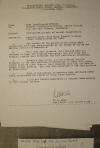
|
9 November
1928.
Confiscated pistols of several
Palestinians, Lt. W. C. Hall, Puerto
Cabezas, to Brigade Intelligence
Officer, Managua.
"1. The pistols
of the several Palestinians were
confiscated when they were arrested on
the charge of buying and selling pistols
and ammunition. ¶ 2. When they were
released their weapons were not returned
to them, but receipts were given them
and later the original permits were
forwarded the Jefe Politico at
Bluefields. ¶ 3. Receipts were given,
and the original permits forwarded to
the Jefe Politico at Bluefields in order
that proper refund might be given them
on their deposits that they had made to
secure pistol permits. This has been
explained to the Jefe Politico at
Bluefields. ¶ 4. Some of the pistols in
question were destroyed after being
confiscated for reason of being
unserviceable. ¶ 5. It is not thought
desirable to reissue these weapons to
the original holders. ¶ W. C. HALL, ¶
1st Lieut., U.S. Marine Corps."
|
|

|
11 November
1928 (1338).
Radiogram from Gen. Feland, Managua, to
Major H. H. Utley, Puerto Cabezas.
|
|
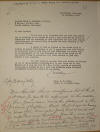
|
12 November
1928.
Letter from Major Chas. F. B. Price,
Bluefields, to Capt. Clyde P. Matteson,
Puerto Cabezas.
"My dear Captain:
¶ It has come to my attention that you
have been indulging in criticism of the
manner in which I have performed my
duties in connection with the Elections
in this Department and have made remarks
reflecting upon the impartiality of
myself and other officers on the
Electoral Mission. ¶ I regret to find no
officer of the Marine Corps so lacking
in common intelligence as not to
appreciate that such remarks to
whomsoever made at this time are most
ill-advised and cannot fail to be
detrimental to the best interests of the
Marine Corps and to the United States in
connection with their efforts to give
this country a fair election. ¶ For this
reason I consider that your action
constitutes an act of reprehensible
disloyalty both to your Corps and to
your country and I warn you that if I
hear further reports of unguarded
statements of opinion by you I will take
immediate steps to secure appropriate
disciplinary action in the matter. ¶
Cordially, ¶ Chas. F. B. Price, ¶ Major,
U.S. Marine Corps. ¶ Copy to Maj. Utley
- ¶ Dear Harold – This is unofficial but
I think it well for you to be informed
in this matter. ¶ This young man made
the statement in the presence of Captain
Best that I was so hard in favor of the
Conservative Party that I could not be
impartial and that this was the result
of Kendall’s efforts in converting me to
such views. ¶ I am certain he has made
similar remarks to his beachcomber
American friends here although of course
I cannot know that."
|
|
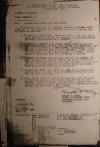
|
15 November
1928.
Addenda to Brigade Field Order No. 7,
Major H. H. Utley,
Puerto Cabezas, p. 1.
"3. In addition
to the dispositions ordered by BRIGADE
FIELD ORDER NO. 7, the following
dispositions of forces of the Eastern
Area will be effected: ¶ a. C.O. Marines
BOCAY will provide one officer and such
additional enlisted men as may be
practicable as reenforcements for BOCAY
river patrol now at GARROBO. ¶ b. C.O.
Marines GARROBO will patrol trails along
the general line GARROBO-BOCAICITO-PASO
REAL DE CUA (all INCLUSIVE), and also in
the direction of PENA BLANCA,
continuously during the period November
19th to 30th inclusive. These patrols to
cover tails to west and southwest of
GARROBO, prevent bandit movement and
deny that territory to bandits. ¶ c.
C.O. Marines CUVALI will maintain
liaison with GARROBO outpost, by means
of patrols, between the dates of
November 19th to 30th inclusive; and
will also constantly patrol that portion
of the MATAGALPA trail between CUVALI
and YAUSCA RIVER (both INCLUSIVE) during
this period. ¶ d. C.O. Marines QUEPI
will patrol the TUMA river continuously
between QUEPI and YARAO (both INCLUSIVE)
between November 19th and 30th,
inclusive. ¶ x. Every effort shall be
made by patrols from posts mentioned to
establish liaison with patrols from the
6th and 11th Regiments between November
19th and 30th. Contact with these
patrols between the dates mentioned may
be expected along the general line CUA
RIVER – PENA BLANCA – YARAO. ¶ HAROLD H.
UTLEY, ¶ MAJOR, U.S. MARINE CORPS, ¶
COMMANDER EASTERN AREA. ¶ NICARAGUA."
|
|
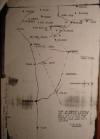
|
15 November
1928.
Addenda to Brigade Field Order No. 7,
Major H. H. Utley, Puerto Cabezas, p. 2.
|
|

|
17 November
1928 (1404).
Radiogram from Capt.
M. A. Edson, Poteca, to
Major H. H. Utley, Puerto Cabezas.
"TO: COMDR
EASTERN AREA INFO: COMDR SEOBRIG CO
OCOTAL ¶ FROM: CO POTECA 17 NOVEMBER,
1928. ¶ 8616 PATROL TWO COMMISSIONED
FORTY EIGHT ENLISTED ONE USN ARRIVED
POTECA NINETEEN THIRTY FIFTEENTH STOP
COCO VALLEY APPEARS SAME AS WHEN PASSED
THROUGH ON WAY TO SANTA CRUZ STOP
DESERTED STOP NO REPEAT NO NEW EVIDENCE
OF BANDIT OPERATIONS STOP BELIEVE COCO
AND CUA RIVERS FREE OF BANDITS COMA
GUASENERAS VALLEY DASH PENA BLANCA
OCCUPIED STOP 1404"
|
|
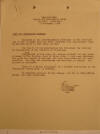
|
19 November
1928.
Memo for Commanding General, Managua,
from Major Hans Schmidt,
Managua, p. 1.
"Enclosed is the
correspondence pertinent to the
destruction of the Fletcher Mine (La
Luz), together with photographs taken by
Marines while in that area, in May. ¶
The report of the destruction was
furnished the Minister of Gobernacion of
the Republic of Nicaragua. ¶ The ass't
manager of the mine, Mr. George Marshall
who was taken prisoner by the bandits,
died of fever about 1 July neaer
Mastawas. His grave was opened by
Marines, his body identified and his
wife notified. His body was disinterred
and reburied at Waspuc. His picture is
enclosed. ¶ There is a Marine detachment
of 1 officer and 29 men in the
Concepcion Mining area, at present. ¶ No
monetary estimate of the damage (as far
as this office knows), has been
submitted. ¶ [signed] H. Schmidt, Major
USMC, B-2"
|
|
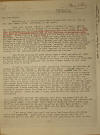
|
1.
19 November
1928.
Letter from Capt.
M. A. Edson, Poteca, to "My
dear Major" H. H. Utley, Puerto Cabezas, p. 1.
"My dear Major:-
¶ Another one of those impertinent
letters but not so long as the last
brain throb, delivered in two parts. ¶
This last patrol, which I really
intended to make a twenty day affair
only to have it broken up by Brigade
Field Order #7 - not only encroached
upon Northern Area territory but I am
afraid went into that part of Nicaragua
supervised by the Southern or Matagalpa
area as well. After reaching Santa Cruz
and not having stirred up anything
exciting - we borrowed the N.A. mules at
that place and visited the Cua and
Guaseneros rivers which have been left
alone since some time in June or July or
whenever Major Rockey got all the
publicity about building a raft at Santa
Cruz. When we reached Santa Helena and
found signs of quite recent bandit
activities, probably extending southwest
and west into the Guapinol and Pastasma
areas, I wanted to turn in that
direction - but finally decided against
it as being altogether outside of the
jurisdiction of one stationed at Poteca.
¶ The first morning we left Santa Cruz -
with revielle at 4:00 am and mules
packed and ready to go at 5:00 - one of
their young hopefuls asked Sgt. Murphy -
“What’s the idea of this midnight
revielle? We never get up until daylight
and we are always ready to get under
weigh at 8:00 o’clock.” ¶ I have a copy
of the letter regarding “Mobility of
garrison at POTECA during dry season.”
Except for one place - KURIAS rapids - I
do not believe the river is any worse in
the dry season than in the wet. The
number of actual portages is reduced but
there are a couple which are and will be
quite difficult. However, in a couple of
weeks you may send an addenda to your
endorsement to the effect that our
mobility is or will be even greater in
the dry season than now. Between here
and Santa Cruz are about 20 excellent
horses - several mules and enough more
below Poteca to enable us to collect a
stable of some 25 horses and about an
equal number of mules. I have at Santa
Cruz 4 horses and 1 mule awaiting the
finis of this latest manouver [sic] when
we expect to return there for them and
round up the remainder on the way down
the river. Stand by for a heavy
requisition for saddle and pack
equipment! ¶ Tomorrow morning two
patrols move out, one under Pollock to
out a trail from here to the CONGOJAS
River and GULKES, and reconnoiter that
place again - the other under Cook to
GUIGUILI which under Brig FO #7 is now
supposed to be garrisoned by an 11th
Rgt. patrol. Upon the return of the
latter patrol, BANA and the Bana trail
will be covered until the 28th of the
month. ¶ I am sorry that you could not
make the inspection of POTECA which was
suggested. Hope that my radio from Santa
Cruz did not embarrass you in any way.
To return to the invitation to look us
over, . . . "
|
|
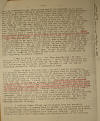
|
2.
19 November
1928.
Letter from Capt.
M. A. Edson, Poteca, to "My
dear Major" H. H. Utley, Puerto Cabezas, p. 2.
". . . this is
extended in all seriousness and it is
believed it is quite feasible. Quilali
offers a landing field for your air
transportation it is a seven hour ride
by mule or horse from there to Santa
Cruz - about the same length of time
from there to POTECA - and one day from
here to BOCAY. You will be away from
your own area about one day only -
always within radio communication and
the trip made this way will be a matter
of not over five days from Cabezas. A
down river boat trip is not tedious,
altho I can not say the same thing for
up river travel. Altho I am desirous of
having you look us over with the idea of
comparison with Quilali and Santa Cruz
of the Northern Area and more especially
with other outposts of our own area -
the main idea is that I crave to see and
talk with you personally. There are
numerous questions of policy which
should be considered and decided in the
very near future. Altho Poteca is a part
- quite a large part I hope - of the
Eastern Area, I believe that you will
recognize that it may appear to us here
that we are in fact a sector within an
area - that our western boundary in
particular is quite uncertain - and that
we are subject not only to your orders,
but as the whim or policy of Brigade
dictates to Brigade and Northern Area as
well. We also have orders to operate at
discretion in the Poteca sector - but we
must admit that our discretion, at
times, is not so good. So far there has
been no conflict of orders of any kind -
but the possibility of such happening is
always present. ¶ I may be wrong in this
- but from remarks made by Stan
Ridderhof and others met around Murra, I
think the NA [Northern Area] considers
our occupation of this place as cracking
the edge of their territory and such
operations as the Murra patrol -
Guiguili - and the Cua as violating
neutrality rights or immigration laws. ¶
There is also the fact that, try as I
can to overlook it, our present strength
here is actually greater than is needed
to “hold” Poteca under present
conditions. It is needless to state that
I would like to keep this entire command
under my control, including the Tulsa
and if some policy of outposts can be
made to continue that control and still
get results, I would like it. The idea
has been advanced that the line of the
EA be extended westward to include the
COCO river to BOCA de CUA. At that time
I think I did not realize just how badly
we hurt the bandit morale and
organization by driving them from Poteca
and offered some objections. However I
now believe it a good idea - and unless
we do not advance to that line, I think
our chances in participating in actual
contact with bandit groups will be
considerably lessened. Also please keep
in mind the mounted patrol which I hope
to materialize before the beginning of
the dry season. My feet are getting
nervous again and I desire to see more
of Nicaragua - a la cavalry mounted on
mules. ¶ I believe these things can be
talked over and decision reached much
better in person than by letter - a
visit here will give you first hand
information of the terrain - and the
command as a whole will appreciate your
presence more than you realize. Also I
can promise you more than tough steak
and saltless beans in the culinary . . .
"
|
|

|
3.
19 November
1928.
Letter from Capt.
M. A. Edson, Poteca, to "My
dear Major" H. H. Utley, Puerto Cabezas, p. 3.
". . . line.
Again I say - think it over and let us
expect you for Thanksgiving. ¶ In line
with Cal Coolidge - we have proclaimed
the 29th a holiday in the sector - other
orders and Sandino permitting. As you
will see by the enclosures - it will be
a gala day, if weather and arrival of
the necessary food and smokes are as
expected. ¶ The canteens are
acknowledged and the thanks of all of us
sent herewith. “Major Utley” is a daily
toast! My best regards to Mrs. Wilson.
Tell her if wishes were aeroplanes, I
would be with her right now. ¶ Pollock
wants me to mention “Boots”. His shoes
are worn out and he is urgently in need
of some suitable trail boot or shoe.
Both he and Cook send regards to the
mess as a whole and you in particular. ¶
As usual, I am attaching a list of
“Wants”. ¶ Best regards to the Officer's
Mess ¶ Respectfully ¶ Edson . . . "
|
|
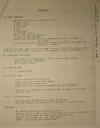
|
4.
19 November
1928.
Letter from Capt.
M. A. Edson, Poteca, to "My
dear Major" H. H. Utley, Puerto Cabezas, p. 4.
". . . ¶ Requests
¶ For boat repairs. ¶ Nails and screws
in assorted sizes. ¶ 1 Draw knife ¶ 1
Jack plane ¶ 2 hammers ¶ 1 saw ¶ 2
hatchets ¶ 4 chisels, asst. ¶ Tar or
similar material. ¶ 1 quart clear
shellac ¶ Waste for calking (use as
packing for above articles in the drop)
¶ 8 or 10 inch 3/4” bolts for making
outboard motor fixtures (Need 6 of
these) ¶ Suggest one boat load of oil
and gas be sent direct from Waspuc, with
no food on that boat. Can use it in
operation under consideration. ¶ For
Sanitary purposes: ¶ One roll wire
screening - galley and garbage house. ¶
Tacks for said screening. ¶ 80 mosquito
nets. ¶ For galley use: ¶ 1 flour
sifter. ¶ For office use: ¶100 or less
Morning reports. ¶ Onion skin and green
file paper. ¶ Small paper for memos etc.
¶ 2 Record books for mess sergeant and
1st sergeant. ¶ Suggest 1st sergeant of
ships detach be asked to furnish some of
this. ¶ From: Post Exchange:- ¶
Recreational facilities already
requested. ¶ One (1) bottle of fountain
pen ink for my personal use. ¶ Addenda:
¶ 50 letter folders for filing purposes.
¶ Tracing cloth - ink - pen holders and
pens (use in map making) ¶ 12 Field Msg
books for radio and personal use ¶ 1000’
- 21 thread line for tent guys. ¶ 1000’
- 3/8” line for corral use. . . . "
|
|
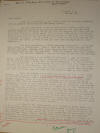
|
22 November
1928.
Letter from Capt.
M. A. Edson, Poteca, to
Major H. H. Utley, Puerto Cabezas, p. 1.
"This is an
addenda to the letter sent via the same
pick-up for the purpose of adding the
following notes:- ¶ (a) The statement in
the operation and routine report to
include 11-17-28 comparing our health
statistics with that at Santa Cruz is
primarily to bring before you and the
Surgeon the fine type of work which
Maddux is doing here. I have twice
radioed suggesting and recommending that
he be examined for promotion to PhM 1/c,
and I again recommend it herein. He is a
good man to have in the organization and
I believe the class of work he has put
out here entitles him to consideration.
¶ (b) Hand grenades and rifle grenades
requested in September have failed to
materialize. Also I need ten (10) rifle
grenade discharger carriers. Please note
these carriers are for the dischargers
and not repeat not for the grenades.
Will you please send out a tracer on
these? The TM also ordered by you to be
sent up has not yet arrived. ¶ (c)
Somewhere in my letter I mentioned a
pair of itching feet. What I
particularly had in mind was not so much
the extension of our present line -
altho that is quite desirable - as the
formation of a roving patrol. I am
broaching this as something of a
“pipe-dream” probably not to be
realized. The project would require not
only your sanction but also that of
brigade, altho my last patrol
(Cua-Guaseneros) came somewhere near the
idea and we seemed to get by with that.
¶ There is a between the Easter Area and
the N.A. - and again between the NA and
the SA., - a horse-shoe shaped No Mans
land. That is the Murra Valley - Cua -
Guaseneros - Pena Blanca - Pavona -
Pantasma - Ojoche. This is difficult
terrain, and the probability is that it
will never be occupied by permanent
Marine Corps garrisons or outposts,
control of that territory being left to
irregular and extended patrols. The
consensus of opinion, I believe, is that
somewhere in this section are Sandino,
Altamirano, and the big majority of the
bandits. Combined patrols such as we
have had the past two months have
succeeded in breaking the enemy morale,
interfered with his concentration but
have produced practically no contact
with the bandits. This is perhaps partly
due to their reluctance to give away
their position when so many patrols are
in the neighbor-hood, while they might
repeat might be tempted to engage with a
single patrol. ¶ My idea is the
organization of a patrol of about 40-50
men, with no fixed limits of patrolling,
free to move in this territory as
outlined, following such clues as it can
pick-up - and reporting in at the
nearest post in any one of the three
areas for rations about once every
fifteen days. Such a patrol would not
supplant the combined manouvers now
being carried on, but would be in
addition to them - a continuous roving
patrol. The idea would be an outfit as
near like the bandits as possible -
using the side trails they use -
becoming bush . . . "
|
|

|
22 November
1928.
Letter from Capt.
M. A. Edson, Poteca, to
Major H. H. Utley, Puerto Cabezas, p. 2.
". . . men like
them - and living like them. This patrol
would have no regular base to return to
every ten to twenty days - but would
probably reach its original supply base
once a month or once every six weeks.
Captain Holmes’ outfit is about the
nearest to this now in existence, but he
is kept busy in the N.A. - and another
mobile patrol with large radius of
action would not be amiss - and two such
roving patrols would, I believe, be as
successful as four combined manouvers
without their aid. ¶ This would be
damned strenuous work - it would require
an outfit of 100 men, for this kind of
patrolling would wear out half the
command a month, and it might not bring
any better results than we have had
already. But I would certainly like to
give it a try. Even tho by itself - gets
no contact with the outlaws, I believe
tat a roving band of this kind would be
quite likely to chase them into the
hands of some other patrol with equally
as good results. As I said before, I
would like to give it a try. ¶ And now
that I have gotten this off my chest,
even tho it gets no consideration, I
shall drink up the coma and turn in -
leaving the Thanks period for another
night."
|
|

|
23 November
1928 (1230).
Radiogram from Major J. Bain, CO
Jinotega, to Major H. H. Utley, Puerto
Cabezas.
"FROM: CO
JINOTEGA ¶ TO: COMDR EASTERN AREA 23
NOVEMBER, 1928 ¶ 0522 FRANCES COLUMBI
ARRESTED JINOTEGA ON SUSPICION PERIOD
SAYS HE WORKED IN PUERTO CABEZAS PERIOD
IS THERE ANY CHARGES AGAINST HIM THERE
WHEN AND WHY DID HE LEAVE THERE QUESTION
DO YOU HAVE ANY INFORMATION ON ALBERTO
ALFARO QUESTION B A I N J 1230"
|
|
|
|
|
PREVIOUS
NEXT
|
|
|
|
|
|
|
|
